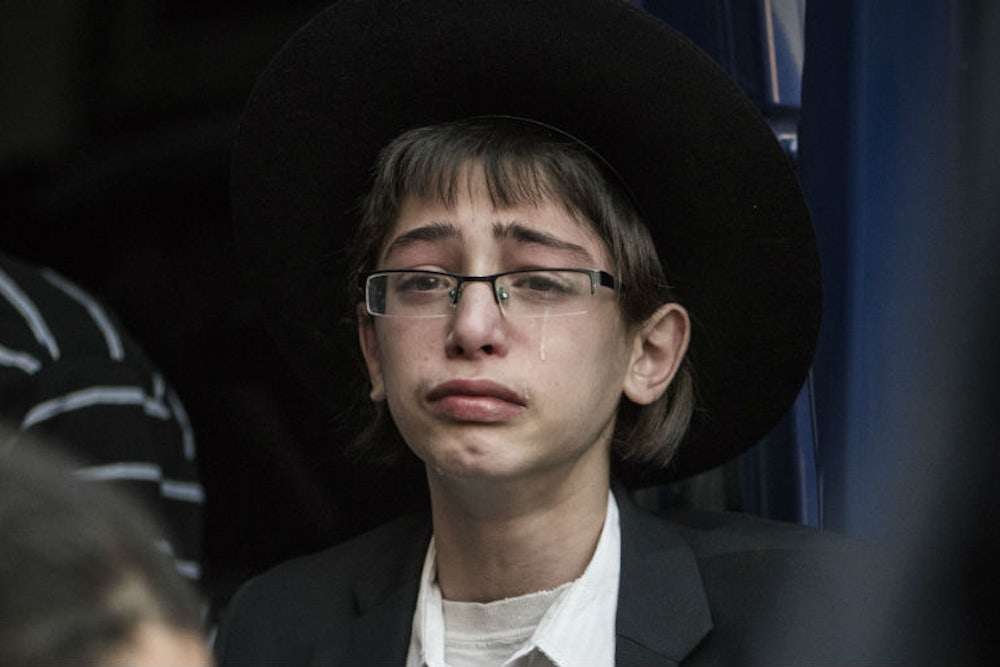They came with meat cleavers and pistols. A little after 7 a.m. on Tuesday, as Jewish worshippers were completing the silent Amidah prayer in a Jerusalem synagogue, two men began shooting and hacking at those trapped inside. Four of the worshippers—all rabbis, three of whom were American and one English—are dead. One of the police respondents, a member of Israel’s Arab Druze community, is in critical condition. Images of the immediate aftermath show sacred books, prayers shawls, and the straps of tefillin strewn among bodies and blood.
The citizenship and piety of the victims is largely immaterial—this was simply brutal, ideological murder. But the choice of victims does tell us something about where these murders come from, and what they mean politically.
In recent weeks, the usual hum of low-grade Palestinian incitement has been raised to a fever pitch. There have been allegations of murder and paranoid rumors of Israeli plans to dismantle Muslim sanctuaries. Lone-wolf terrorists have rammed their cars into crowds and stabbed young commuters at bus stops. The Israeli security forces, expert in disrupting networks and intercepting infiltrations, have found themselves helpless to stop it. How do you predict an attack by a single local resident armed only with a car and a kitchen knife?
There is irony in the latest attack. The synagogue was in Har Nof, an ultra-Orthodox neighborhood in West Jerusalem. The worshippers lived in internationally recognized Israel and almost certainly never served in the army. They would never approach the Temple Mount, the holy site where recent visits by Jews have supposedly triggered the latest wave of Palestinian violence, because they believe that God’s law forbids it. In other words, these worshippers should be among the least offensive to Palestinians.
This is not to say that, for instance, last week’s murder of 26-year-old Dalia Lemkus was less obscene because it happened near a West Bank settlement. But the senselessness and brutality of the synagogue assault, and the otherworldliness of the victims, lays bare the inadequacy of rational political explanations for terror. No doubt the murderers had their grievances (and some perhaps were reasonable), but the butchery in Har Nof shows that any sense of strategy has been overwhelmed by hate. The murder of non-Zionist Torah scholars is an attack on Jews more than Israel, and explaining it requires an understanding of hatred, not of politics. Perhaps the current celebrations throughout the West Bank and Gaza—replete with songs of praise on mosque loudspeakers and the festival-like delivery of sweets to children—goes at least part of the way to providing that.
Rarely has it been clearer: these men were killed simply because they were Jews living in the land of Israel. That they were rabbis killed at prayer is a potent symbol of the attack's senselessess, but their orthodoxy also serves as evidence of how utterly self-defeating Palestinian terrorism is.
The ultra-Orthodox, after all, are some of the most pragmatic and powerful players in Israeli politics. For the last two decades, the ultra-Orthodox parties have been kingmakers, key to the governments of both right and left due to their flexibility on negotiations with the Palestinians. It was the largest of these parties, Shas, that offered Yitzchak Rabin the crucial coalition support he needed to proceed to the Oslo accords. Together, the two main ultra-Orthodox parties hold 18 seats in Israel’s 120-seat, famously fractious parliament. Any conceivable left-leaning coalition would rely on their votes.
But in recent years, the ultra-Orthodox shifted strongly in the direction of the hawks. This shift, and its reasons, has mirrored the rest of Israeli society, and it has very little to with revisionist or expansionist ideology. The ultra-Orthodox, dismissive of Israel’s secular establishment and content to wait for the messiah, continue to be among those least ideologically committed to Jewish sovereignty over the land. But their confidence in the Palestinians and their leadership, in their willingness or ability to stop incitement and curb terrorism, has diminished dramatically.
To many Israelis today, it no longer matters that Palestinian President Mahmoud Abbas’s security forces work well with Israel or that he is clearly preferable to Hamas. (Abbas condemned today’s attack while blaming it on Israeli incitement; Hamas simply welcomed the murders.) But preferable does not mean acceptable. And when Abbas's calls for a “holy war” against Jewish “contamination” of the Temple Mount is answered with butcher knives in a synagogue, the preferable does not seem acceptable at all. So the same pragmatism that convinced ultra-Orthodox leadership to back the peace process will continue to turn their rank-and-file against the Israeli Left. Even Aryeh Deri, the wiliest and most dovish among ultra-Orthodoxy’s political leaders will find himself inexorably pulled rightward.
Zionism has always required a balance between the aspirational and the pragmatic. Israel’s most deft leaders threaded the needle between the desire for the resurrection of ancient Jewish sovereignty and the compromises necessary for peace. For years, the pragmatists, those who could put in perspective the starry-eyed yearning for expansive Jewish sovereignty, were the champions of negotiation. But now it’s those pragmatic negotiators who seem starry-eyed, and to the residents of Har Nof, more walls and checkpoints will seem the safer bet.
